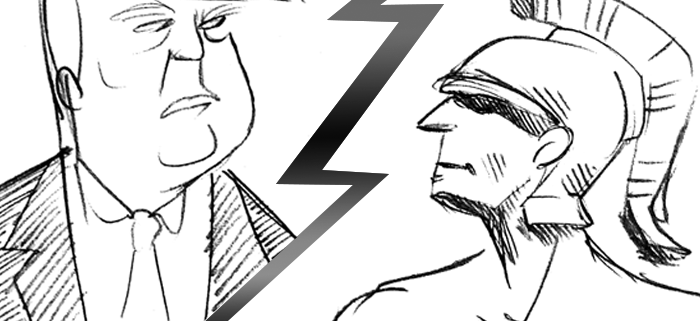POINT: USC administration’s role is not political advocacy
USC might be picking sides during this contentious time in America. Last week, a description of the Rally for Inclusion and Tolerance was included on the USC Dornsife College Calendar of Events website, where listings for events on campus are published for student and faculty reference. At the rally, two students in attendance hoisted a banner that read “Trojans vs. Trump.” On Inauguration Day, USC distributed an email memorandum reminding students of an initiative aimed at promoting student mental and physical health. The initiative, “Mindful USC,” has been an asset for students over the past two years, and a similar email notification was sent last January. However, in addition to being from the traditional co-chairs of “Mindful USC,” Dean of Religious Life Varun Soni and Professor Allen Weiss, this year’s email was provided by Provost Michael Quick. The inclusion of the University’s highest academic administrator and the substantially longer memorandum suggests that there was an impetus separate from the desire to simply provide a regular notice about a years-old program.
It is no secret that there are plenty of “Trojans vs. Trump.” Undocumented Trojans, the LGBT community and several other groups of students have valid apprehension in the wake of President Donald Trump’s divisive campaign rhetoric and policy goals. It is also likely that there are many people in USC’s administration that share the fears and concerns of students, and from his communications with the USC community since the election, Quick seems to be chief among them.
However, the University as an organization should not appear to reject one political stance in favor of another. Organizations on campus should be free to bring whomever they want to speak on any issue, but the University should exercise discretion when choosing whether or not to publicize an event or speaker under the USC banner.
It is one thing for student groups to be allowed to peacefully protest on USC’s campus, to form political advocacy groups, offer peer counseling to each other or — if the situation is serious enough — suggest referral to University-sponsored mental health initiatives. It is quite another for the University itself to seemingly endorse and publicize a rally against the President of the United States or to infer that the entire student body needed to be reminded about a mental health initiative on the day the new president was sworn in. The Rally for Inclusion was marketed at the whole student body, and the memorandum was sent to the whole student body — but neither clearly represented the beliefs and needs of the whole student body. In fact, the recognition of the rally against Trump and the timing of the memorandum may have the combined effect of making conservative students who voted for Trump feel a little less welcomed at USC.
The University should act as a facilitator of dialogue and learning, not political advocacy. Regardless of if members of the Trojan community believe that casting a particular vote was the right thing to do, official University action that infers such a belief that is held on a campus-wide scale will overstep the bounds of institutional propriety and can only harm students who likely already fear ostracization.
Individuals should not be subject to restrictions on political expression on campus. There is no doubt that students should engage in political advocacy and do their best to make their voices heard in houses of government the whole world over. Without political pressure and engagement from young adults, the needs of millennials will simply not be represented. Yet, it is emphatically the duty of the University to teach students what they need to know in order to succeed in their chosen fields, not to separately ordain which political opinions are in need of support or rejection.
Many groups on campus already exist to pursue political ends. In the interest of a balanced education and welcoming campus environment, the University administration should not be among them.
Trevor Kehrer is a senior majoring in political science. “Point/Counterpoint” runs Wednesdays.

